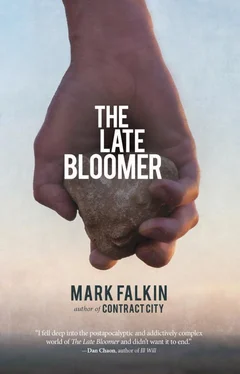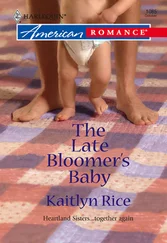“When you were talking in your sleep you said something to me. Do you remember what you said?”
“What did I say?”
“I’m asking you.”
“Uh…”
I scrutinized his face. He seemed confused by my behavior.
“Um, I think I said, ‘oh no it’s you’?”
I shook my head. “Before that.”
He shook his head back at me, shrugged. If he was lying to me, he was a thespian extraordinaire. If he was lying to me, it wasn’t intentional.
“I don’t remember saying anything before that. What was it?”
“It doesn’t matter, okay?” I could see trying to remember pained him.
“Tell me.”
“No, Nate.”
“Why won’t you tell me?”
“Because it doesn’t matter and because I don’t think it was you telling me. It wasn’t you talking.”
His shoulders hopped up and down as he immediately began crying. “I’m sorry. I’m sorry…”
“For what?”
“For what I told you. Whatever it was.”
I slid over and hugged him. He hugged back hard and desperate. His mouth was to my ear and mine to his. “I won’t ask you to remember, okay?”
His chin drilled into my neck as he nodded. He sniffed loudly in my ear and deep in his throat his little boy voice whined. He tried to contain it but he burst out in a hoarse cry.
“It’s all right, Nate. I’m glad I came here. I’m glad I found you.”
His chin dug in more, his grip on me tightened. His whispers came out wet, not in his new-world voice, but in his old-world mucosal little boy’s voice, the voice he’d have used if talking to his daddy after he’d taken a nasty fall off his bicycle. I felt his breath there, and into the swirl of my ear he pleaded, “Please don’t leave me. You can make my head hurt. I don’t care. Just don’t leave me here.”
He clung and his body shook.
The morning is an amethyst sky that melts away into blue by full dawn. November cold comes with it. Here in the hills, winter’s prelude arrives early. Uncontrollably shivering on this couch, I understand what it means to need wood. The steel wood rack lining a wall of the carport stood empty save for maybe enough wood to burn through in one cold day. Today, the front and the rain having passed, was that cold day. Halloween’s celebration of the harvest, of mocking the death promised by winter, was over. Now, the cold.
We could see our breath indoors. We’d need wood to keep warm and to cook, there being neither power nor gas. We’d need it for flickering comfort.
My old life had its fires and fireplaces, but those were always novel, weren’t they? Winters in Austin got below freezing, sure, but we didn’t really need a fire. It was extra. A blazing hearth in the room was for atmosphere, a First World aesthetic.
This morning is the first time I’ve ever felt the cold as a threat. It’s a threat when you’re not sure you can escape it, that it might seep into your bones and remain.
Cold had infiltrated my bones overnight. In the purple dawn, it wasn’t leaving. Dawn light tickling my eyelids, stirring my circadian stores of serotonin, didn’t wake me. Cold did the waking. My body announced via biological bullhorn: wake up, you might die if you don’t find warmth soon .
Layering helps. In a hall closet next to the bathroom I found a skuzzy sweatshirt someone had clearly used for a smock while house painting, and an old peacoat that fit me well, that and a burnt-orange longhorned scarf and one of those hunting caps with woolen ear flaps. I pulled a smallish jean jacket from the closet and set it next to Nate along with another one of those caps that looked too big.
I covered him up with a blanket I’d found draped over an armrest. I let him sleep. He lay there with his breath pluming out into cartoon dialogue balloons. In each, his hold on me tight and bony: just don’t leave me here .
In my ridiculous city-boy-playing-ranch-hand outfit, Maggie and I quietly exited through the screen door by the kitchen. I needed time away from him to think. Outside, crunching the gravel, keeping a lookout for roving dogs, I thought we could stay here, me and Nate. We could live out the winter here. An entire cold season really could change things.
Cold’s what you apply to an injury, isn’t it? Time heals.
Cold plus time…
What would the world full of children—those at latitudes farther away from the equator, that is—what would they do when the cold came upon them and there they are out in it? Would it change them? Would they, to survive, deign to use old-world warmth, occupy buildings, use machines?
Probably not, I thought. They’d go old old world and build big goddamned fires out in the open. Like they did the burial pits. The good thing was, they’d have to stay near them.
Maggie trotted next to me. I stopped in the middle of the gravel drive and did a three-sixty turn. What a beautiful place. I’d been to Durango, Colorado, and this place was the Texas version. No kidding. Yeah, I could live out the winter here. A good amount of food sat in the pantry. The fridge and freezer have salvageable items that I can keep cool at the stream I crossed on my way in. And there! There’s the huge chicken coop the size of a racquetball court. There they are, clucking and squawking around. The list of things to do in my mind populated fast. I loved the feeling of having things to do other than worry and be afraid, though that’s always the bass line of life’s song. The way it was in the old world, too, just a different set of them, a manufactured set. These were real because they pertained directly to survival—not acceptance, not ambition, not material attainment, not even getting laid—and because this was so, I felt a burgeoning wholesomeness springing from my feverish to-do list.
This is the utopia I’d hoped for. But I’d wanted it with Kodie. How I missed her now. She’d be so into this idea of staying here, just us, for the winter at least.
I let my finger fiddle with the glock trigger so as to push the thoughts of her away. A redheaded turkey vulture glided on a thermal at the mouth of the valley. I aimed and fired at it. The gun’s report echoed and all went quiet. The bird didn’t even so much as dip a wing in response.
The slight wind coming from behind brought me Nate’s cry.
I jogged back and got within earshot, where we could see each other’s faces.
“My truck’s right there,” I’d pointed to the side of the house. “What, you think I’d just walk away from you?”
He leaned over to see it around the corner. “Oh,” he said. His head panned the scene from side to side as I walked up the incline to the wooden wraparound porch where he stood. “Where are the dogs?”
“Dunno. I’ll rattle the feed bins. They’ll come running, I’m sure.”
He took a step back into the shadow of the porch. “Wait until I’m inside, okay?”
“Sure. Maggie’s okay for you, right?”
He paused, nodded, slowly at first, then assertively, trying to please me by being brave. In that moment, Johnny’s features overlay Nate’s, making me pause my ascent. Maggie sat next to him, looked up at Nate, back at me. The dog knew we spoke of her; the dog knew I was experiencing powerful emotion, and that Nate’s fear was not yet quelled just because I said it should be.
As I say this, dear reader, know that I am leaning forward to stroke my dog’s sunbaked fur. The kayak shimmies as I do. She keeps her eyes closed, enjoys the sun, the water’s rock, having felt me do this innumerable times on this river and knowing that when I do so that I always think how her coming into my life when it did was pure providence.
Now that my old world had been forever stripped away, I can say things like that because now I believe it. And I can also say this: that it’s by providence that I’m doing this, telling you this story while heading toward the bay, for what else could it be?
Читать дальше












